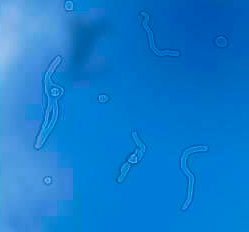Vitreous Floaters
Many people experience vitreous floaters in their field of vision. These usually are seen as a shadow that follows the line of sight. They are variously described as insects, mosquitoes, cobwebs or hair that may come and go in the line of sight. Sometimes larger floaters may be seen as patches drifting in and out of the vision, and maybe a nuisance to someone reading, driving, using a computer, or to general concentration.
The sudden appearance of floaters may indicate a serious problem, such as a retinal tear or detachment, particularly if there are accompanying light flashes. These are potentially serious issues, so any significant changes in the number and appearance of floaters warrant consultation with the eye doctor immediately. One thing to note is that retinal tears and detachments, while serious, are entirely painless. A timely visit to the eye doctor may prevent a retinal detachment, as a small retinal tear can be successfully lasered, preventing its worsening, thus avoiding retinal detachment surgery.
The natural history of floaters is to gradually improve with time, as the vitreous gel contracts and the gel body moves towards the front of the eye, away from the retina. This results in many cases of floaters getting progressively better; however, it also requires some “work” on the part of the patient. The patient needs to do the following:
- Ensure that the floater is not potentially dangerous, so visit an ophthalmologist to exclude issues such as a retinal tear or detachment. This helps allay the fear that the floater may lead to a poor outcome.
- Once this reassurance has been received, set your mind at ease and take comfort that the floater is no more than a nuisance.
- If the floaters are old, try not to be too obsessive about looking for them every moment of the day. Essentially, one has to accept and “let go” of the fact that the floaters are present.
- The earlier one can let go of the fact that floaters are present, the quicker they will tend to go away.
Floaters are a bit like “dirt or lint” in an otherwise clean room. Some people are very bothered by the fact that they are there and ignore the fact that the vision has no other problems. Patients who are able to accept this tend to recover the quickest from nuisance floaters.
Call our EyeWise Vision Clinic to fix an appointment now.
About Dr Christopher Khng
Dr. Christopher Khng, specialises in Complex Cataract and Anterior Segment Reconstruction Surgery, in particular, Iris Reconstruction and Surgery for Aniridia. His other areas of expertise include Complex Lens surgery, New Lens and Phacoemulsification technologies, Refractive surgery, Phakic IOLs (the Implantable Collamer Lens, ICL), and small-incision, topical anesthesia phacoemulsification cataract surgery.
He completed his first two years of medical undergraduate studies in Aberdeen University, Scotland (UK), finishing top in his medical class in both years. Because of cost, he completed his medical degrees of MBBS at National University of Singapore (NUS).
Dr. Khng served as Registrar, then Associate Consultant Ophthalmic Surgeon at the Singapore National Eye Centre (SNEC). Following his stint in SNEC, Dr. Khng was a Consultant at The Eye Institute, Tan Tock Seng Hospital, Singapore.

Dr Christopher Khng
MBBS, M.Med(Ophth), FRCS(Edin), AMS(Ophth 2003) Consultant Ophthalmologist

